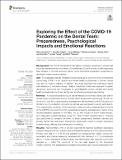Exploring the effect of the COVID-19 pandemic on the dental team : preparedness, psychological impacts and emotional reactions
Abstract
Background: The COVID-19 pandemic has placed increased demands on clinical staff in primary dental care due to a variety of uncertainties. Current reports on staff responses have tended to be brief enquiries without some theoretical explanation supported by developed measurement systems. Aim: To investigate features of health and well-being as an outcome of the uncertainties surrounding COVID-19 for dentists and dental health professionals in primary dental care and for those in training. In addition, the study examined the well-being indices with reference to normative values. Finally a theoretical model was explored to explain depressive symptoms and investigate its generalisability across dentists and dental health professionals in primary dental care and those in postgraduate training. Methods: A cross-sectional survey of dental trainees and primary dental care staff in Scotland was conducted in June to October 2020. Assessment was through “Portal,” an online tool used for course bookings/management administered by NHS Education for Scotland. A non-probability convenience sample was employed to recruit participants. The questionnaire consisted of four multi-item scales including: preparedness (14 items of the DPPPS), burnout (the 9 item emotional exhaustion subscale and 5 items of the depersonalisation subscale of the MBI), the 22 item Impact of Event Scale-Revised, and depressive symptomatology using the Patient Health Questionnaire-2. Analysis was performed to compare the levels of these assessments between trainees and primary dental care staff and a theoretically based path model to explain depressive symptomology, utilising structural equation modelling. Results: Approximately, 27% of all 329 respondents reported significant depressive symptomology and 55% of primary care staff rated themselves as emotionally exhausted. Primary care staff (n = 218) felt less prepared for managing their health, coping with uncertainty and financial insecurity compared with their trainee (n = 111) counterparts (all p's < 0.05). Depressive symptomology was rated higher than reported community samples (p < 0.05) The overall fit of the raw data applied to the theoretical model confirmed that preparedness (negative association) and trauma associated with COVID-19 (positive association) were significant factors predicting lowered mood (chi-square = 46.7, df = 21, p = 0.001; CFI = 0.98, RMSEA = 0.06, SRMR = 0.03). Burnout was indirectly implicated and a major path from trauma to burnout was found to be significant in primary care staff but absent in trainees (p < 0.002). Conclusion: These initial findings demonstrate the possible benefit of resourcing staff support and interventions to assist dental staff to prepare during periods of high uncertainty resulting from the recent COVID-19 pandemic.
Citation
Humphris , G M , Knights , J , Beaton , L , DeAraujo , M , Yuan , S , Clarkson , J , Young , L & Freeman , R 2021 , ' Exploring the effect of the COVID-19 pandemic on the dental team : preparedness, psychological impacts and emotional reactions ' , Frontiers in Oral Health , vol. 2 , 669752 . https://doi.org/10.3389/froh.2021.669752
Publication
Frontiers in Oral Health
Status
Peer reviewed
ISSN
2673-4842Type
Journal article
Description
The work was supported by NHS Education Scotland and University of St Andrews provided the open access publication fee.Collections
Items in the St Andrews Research Repository are protected by copyright, with all rights reserved, unless otherwise indicated.

